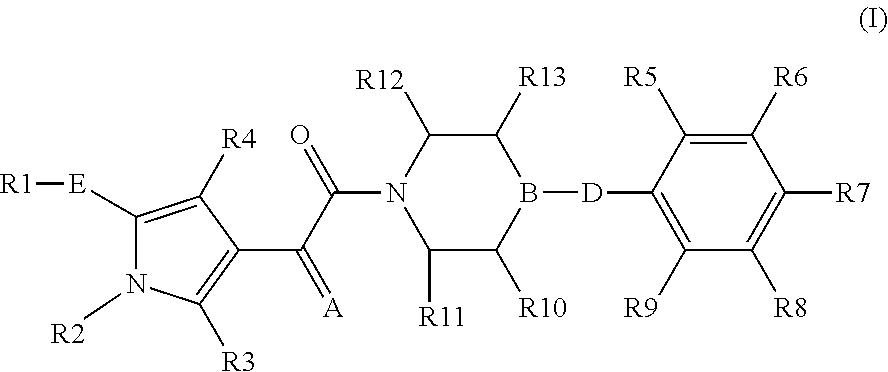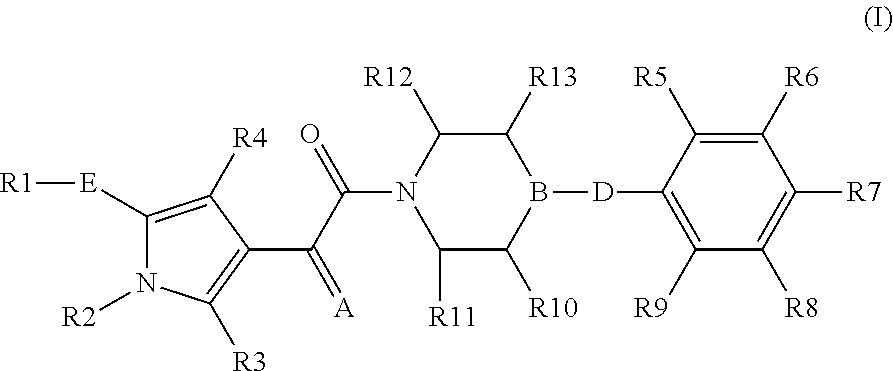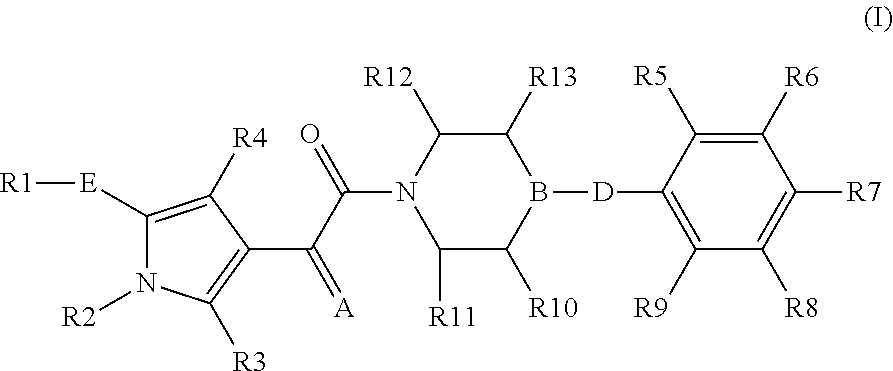Pyrrole derivatives as P2Y12 antagonists
a technology of pyrrole derivatives and antagonists, applied in the field of compounds, can solve problems such as thrombotic complications, serious pathological conditions, and emboli that travel through the circulatory system
- Summary
- Abstract
- Description
- Claims
- Application Information
AI Technical Summary
Problems solved by technology
Method used
Image
Examples
example 1
1-(2-Methyl-5-phenyl-1H-pyrrol-3-yl)-2-[4-(3-trifluoromethyl-phenyl)-piperazin-1-yl]-ethane-1,2-dione
[0242]
[0243]a) 2-Methyl-5-phenyl-1H-pyrrole: To 5.00 g (28.37 mmol) of 1-phenyl-1,4-pentandedione 6.815 g (71 mmol) ammonium carbonate were added. The mixture was heated at 100° C. for 4 days. During this time further 6.815 g ammonium carbonate were added in 1 g portions. The reaction mixture was treated with water and extracted with ethyl acetate. The separated organic layer was dried (MgSO4) and evaporated to yield 4.13 g (93%) of 2-methyl-5-phenyl-1H-pyrrole.
[0244]b) (2-Methyl-5-phenyl-1H-pyrrol-3-yl)-oxo-acetic acid: To a stirred solution of 14.32 g (91 mmol) 2-methyl-5-phenyl-1H-pyrrole in 50 ml THF a solution of 11.56 g (91 mmol) oxalyl chloride in 10 ml THF was slowly added at 0° C. The solution was warmed up to RT and stirred for 2 h. The reaction mixture was poured into water, treated with Na2CO3 and extracted with ethyl acetate. The separated organic layer was dried (MgSO4)...
example 55
3,5-Dimethyl-4-{2-oxo-2-[4-(3-trifluoromethyl-phenyl)-piperazin-1-yl]-acetyl}-1H-pyrrole-2-carboxylic acid ethyl ester
[0248]
[0249]a) 3,5-Dimethyl-4-oxalyl-1H-pyrrole-2-carboxylic acid ethyl ester: To a solution of 0.2 g (0.956 mmol) 4-acetyl-3,5-dimethyl-1H-pyrrole-2-carboxylic acid ethyl ester in 3 ml pyridine 0.318 g (2.868 mmol) SeO2 were added under argon. The reaction mixture was stirred at 100° C. for 4 h. The mixture was filtered off and 20 ml of a NaOH (5%) were added to the solution. The aqueous phase was extracted with diethylether and then the aqueous phase was acidified with 1 N HCl. The aqueous solution was extracted with ethyl acetate. Then the organic phase was washed with brine and dried over anhydrous magnesium sulfate. The solvent was evaporated to yield 180 mg (79%) of the title compound.
[0250]b) 3,5-Dimethyl-4-{2-oxo-2-[4-(3-trifluoromethyl-phenyl)-piperazin-1-yl]-acetyl}-1H-pyrrole-2-carboxylic acid ethyl ester: To a solution of 0.15 g (0.627 mmol) of 3,5-dimeth...
example 56
3,5-Dimethyl-4-{2-oxo-2-[4-(3-trifluoromethyl-phenyl)-piperazin-1-yl]-acetyl}-1H-pyrrole-2-carboxylic acid
[0251]
[0252]To a solution of 0.100 g (0.221 mmol) 3,5-dimethyl-4-{2-oxo-2-[4-(3-trifluoromethyl-phenyl)-piperazin-1-yl]-acetyl}-1H-pyrrole-2-carboxylic acid ethyl ester in 2 ml ethanol and 1 ml water 0.018 g (0.443 mmol) NaOH were added. The solution was stirred at 80° C. for 5 h. The solvent was evaporated and 1 N HCl was added to the residue. The precipitate was filtered off and dried to yield 80 mg (85%) of the title compound. MS 424.15 (M+H)+,
[0253]The following compounds in table 2 were synthesized starting from example 56 using the TOTU procedure described above:
[0254]
TABLE 2Exam-MSplestructurename(ESI+)57[(3,5-Dimethyl-4-{2-oxo-2-[4-(3- trifluoromethyl-phenyl)-iperazin-1-yl]- acetyl}-1H-pyrrole-2-carbonyl)- amino]-acetic acid ethyl ester509.32584-{2-[4-(3-Chloro-4-fluoro-phenyl)- piperazin-1-yl]-2-oxo-acetyl}-3,5- dimethyl-1H-pyrrole-2-carboxylic acid (furan-2-ylmethyl)-a...
PUM
| Property | Measurement | Unit |
|---|---|---|
| weight | aaaaa | aaaaa |
| temperature | aaaaa | aaaaa |
| pH | aaaaa | aaaaa |
Abstract
Description
Claims
Application Information
 Login to View More
Login to View More - R&D
- Intellectual Property
- Life Sciences
- Materials
- Tech Scout
- Unparalleled Data Quality
- Higher Quality Content
- 60% Fewer Hallucinations
Browse by: Latest US Patents, China's latest patents, Technical Efficacy Thesaurus, Application Domain, Technology Topic, Popular Technical Reports.
© 2025 PatSnap. All rights reserved.Legal|Privacy policy|Modern Slavery Act Transparency Statement|Sitemap|About US| Contact US: help@patsnap.com



